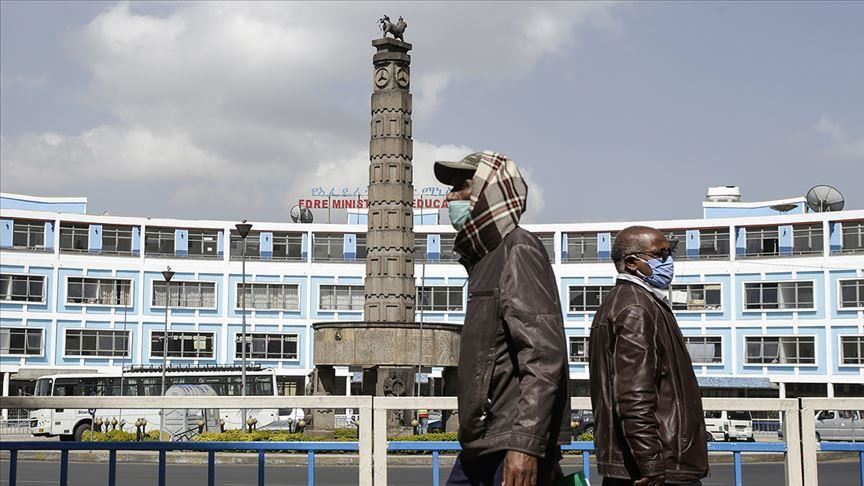Ethiopians struggle to cope with COVID-19 fears
Art café and gallery provides relief to people stressed due to coronavirus and other worries

ADDIS ABABA, Ethiopia
On a cold blustery summer morning, heightened fears of the COVID-19 pandemic blended with a glimmer of hope shroud the Ethiopian capital Addis Ababa.
The wailing sirens of the speedy emergency ambulances that transport COVID-19 patients from different corners of the city to treatment and quarantine centers throughout the rainy day cause uneasiness across the city.
Worries about job security, peace, and unity in the Horn of African nation also play out in the daily conversations of many people in the capital.
Oasis from worries
To fight fears, some people of the bustling metropolis with an estimated 5 million people, which has not seen a COVID-19 total lockdown, have begun flocking to Alem Art café and gallery. Despite the hustle and bustle, the small room filled with books and eye-catching paintings was strangely quiet. Some were engrossed in sketching landscapes and portraits while others were reading books and sipping their morning coffee.
Alem Getachew, a soft-spoken, wheelchair-bound female painter and also the gallery’s founder and owner, told Anadolu Agency that the gallery was transformed to provide creative stress relief service.
“As all members of our society are experiencing fears of coronavirus, I decided to help people release their stress and anxieties in productive ways,” Getachew said.
The gallery has become a space where people read books, share stories, and discuss ways to cope with the pandemic and create a support network, she explained.
“We also help them develop their painting skills and realize their potential,” Getachew said. “Over the last couple of months, young people from different corners of the city have been spending time with us.”
The aroma of the boiling coffee, the sweet incense that often accompanies the Ethiopian coffee ceremony, and the low, melodious music all helped make the people in the room feel at home.
Alemnehe Kebede, an aircraft technician who frequents the art café, said he often feels comfortable and relaxed while discussing issues with friends.
Coping with fears
“Many young people who frequently come here exchange information and skills to cope with COVID-19 and other worries,” Kebede said, adding that the art cafe had been organizing poetry readings and inspirational speeches by invited guests.
Ayalewu Girma, another visitor, said, “I’m in the service industry and fear losing my job. Many of us are also worried by ethnic divisions in the country.”
“When we’re at the gallery, we breathe a sigh of relief at least for the time being,” he remarked.
Epicenter of pandemic
As the morning rain subsided, the noisy Gergi, a commercial and residential area of the capital where the gallery is located, saw people with face masks filling the street with little or no social distancing.
Health officials warned the spate of new cases of COVID-19 that has dramatically spiked since June was the beginning of the peak of the pandemic that would stretch throughout August.
Liya Tadesse, Ethiopia’s health minister, last week warned that reckless disregard for preventive measures could bring about a worst-case scenario during the peak.
To date, according to the Health Ministry, the current caseload stands at 20,356 with 365 deaths, while more than 9,000 people have recovered. The majority of cases were reported in the capital.
Bereavement rituals
Milka Ibrahim, a psychologist who provides COVID-19 stress management counseling, told Anadolu Agency that fear, worry, and stress are normal responses to pandemics and situations that threaten our individual and collective well-being.
According to her, one of the most permanent anxieties was linked to the deeply entrenched Ethiopian concept of death and funeral rituals.
“Ethiopians feel relieved when their loved ones are seen off with an elaborate funeral procession and an extended ritual of bereavement,” Ibrahim noted, adding that unattended and untimely deaths are seen as traumatic.
Despite minor cultural differences, Ethiopian society pays respect to the deceased with excessive grief expressed in crying, wailing loudly, beating chests, and falling to the ground as if to harm oneself.
Hundreds of people will attend a well-organized burial procession. The grieving will normally last at least three days, and close family members will continue to gather for weeks.
“People feel the coronavirus pandemic has denied them the respected rituals of grieving,” Ibrahim remarked. “This is one of the permanent fears of the pandemic.”
According to Ibrahim, persistent fear could “impair decision-making abilities and finding solutions to worries.”
Glimmer of hope
The dark and cold Ethiopian rainy season is also blessed with intermittent sunrises that symbolize hope.
Early in July, Ethiopian Prime Minister Abiy Ahmed, who heads a coronavirus ministerial task force and presided over the launch of a campaign that aims to test 200,000 people, said the growing capacities in all aspects of prevention efforts will help contain the pandemic.
Liya also noted at the launch ceremony: “The nation managed to prevent 85% of possible cases and 95% deaths in comparison to the 1.5 million people originally expected to contract the virus by mid-July.”
Echoing a view shared by many in a profoundly religious country, Kebede said: “God willing, everything will be fine.”





